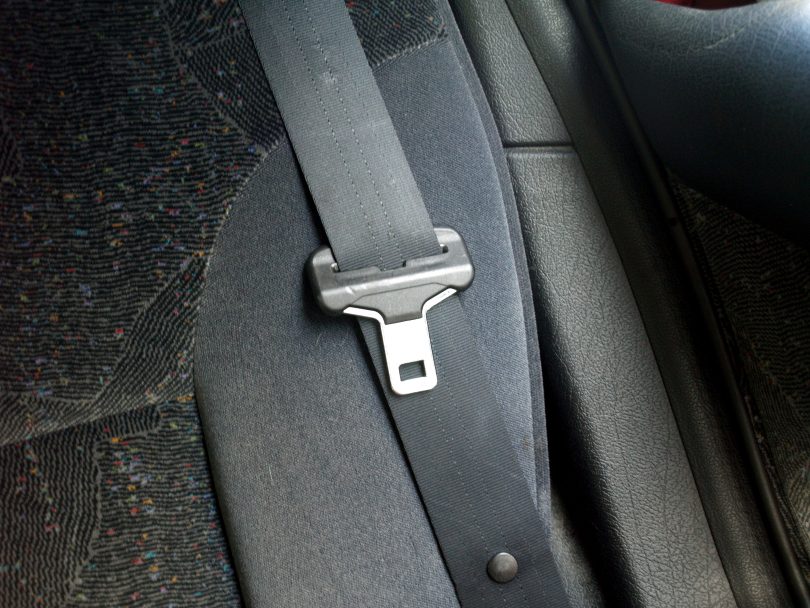By Mia Ping-Chieh Chen
BU News Service
BOSTON — Two bills authorizing police to pull over and ticket drivers if anyone in the car is not wearing a seat belt have reignited a long debate over traffic safety vs. government interference.
Under current law, police in Massachusetts can only issue a ticket for a seat belt violation if they pull the driver over for another offense. Under the “secondary enforcement” policy, it is illegal not to wear a seat belt, but that cannot be the reason for police to pull a driver over.
The bills from Sen. Paul Feeney, D-Foxboro, and Rep. Jeffrey Roy, D-Franklin, which have nine co-sponsors, would make seat belt violations a primary offense and raise fines. Police could stop drivers if they see anyone in the vehicle not wearing a seat belt, even without other infractions.
Under the bill, drivers and passengers over the age of 16 would be fined $50 for not wearing seat belts. Also, the driver would be charged an additional $50 for each unbelted passenger between the ages of 12 and 16.
“We know that when people (are) wearing their seat belts and involved in a crash, the fatalities are less,” said Feeney, the vice chair of the Legislature’s Committee on Public Safety and Homeland Security.
Since secondary enforcement passed in 1994, several proposals to further regulate usage have been stymied in the Legislature. Statehouse News reported the unsuccessful attempts in 2001, 2004, and 2005-06 session, despite then-Gov. Mitt Romney’s willingness to sign the bill into law.
Feeney said he is optimistic this time, that he senses a large number of committee members are interested in the bill.
“Our hope is that the bill comes out favorably rather quickly. We can debate this bill and then get it to the governor’s desk, hopefully before the end of the session,” he said.
Massachusetts ranked 46th out of 50 states on seat belt usage, with around 82 percent in 2018, according to the data from the National Highway Traffic Safety Administration. That same year, New York and Connecticut reached more than 90 percent.
“If we can get to 91 or 92 percent of people wearing the belt in the vehicles, then we would take steps to do that.” Feeney said. The nationwide seat belt use rate was 89.6 percent, as measured by NHTSA’s National Occupant Protection Use Survey.
NHTSA’s Art Kinsman told lawmakers there were 340 people killed on Massachusetts roads in 2017. Of those who died in crashes, 76 percent were unrestrained in their vehicles.
As quoted by the State House News Service, Kinsman also said that 85 percent of pickup truck drivers and 84 percent of SUV drivers who were killed were unrestrained, higher percentages compared to passenger car and van fatalities.
Nearly one in five Massachusetts drivers, which represents around 1.2 million people, still don’t buckle up in the car, AAA’s Public & Legislative Affairs director Mary Maguire testified.
“And we are 30 times more likely to be ejected from our vehicles when we are not restrained.” she said.
Primary enforcement of seat belt use has been a priority for AAA across the country, Maguire said in an interview. Currently, only 34 states and Washington D.C. have passed a primary seat belt law.
“And obviously, we’d like to see every state in the country, including Massachusetts, passed the primary bill,” she said.
Arguments against primary enforcement suggest law enforcement could intrude on a citizen’s personal decision, and that it might lead to racial profiling if police officers use their primary enforcement to target certain motorists.
The American Civil Liberties Union of Massachusetts has previously opposed primary enforcement, Statehouse News Service reported. They argued that such a policy could be selectively enforced and lead to racial profiling.
A study by the ACLU released in 2016 found that black motorists in Florida were stopped and ticketed for seat belt violations in far greater numbers than white motorists, nearly twice as often statewide and up to four times as often in certain counties.
“We would be in favor of passing or of seeing a data collection bill that relates to racial profiling passed in Massachusetts,” Maguire responded.
She agreed that racial profiling has long been a concern when it comes to traffic safety bills, and said that AAA considers it a critically important issue that requires attention.
She said studies done in six or seven states with primary seat belt bills showed no increase in the number of citations given to people of color upon passage of a primary seat belt bill.
“We also think it’s important to remember that the traffic safety piece is a really critically important life-saving piece of the equation.”
Arguing against a primary bill, former Rep. Michael Costello told Statehouse News in 2009 that “when you get to adulthood, you have to make choices. Should we be forcing you into those choices?”
This story was originally published in the Attleboro Sun-Times.





